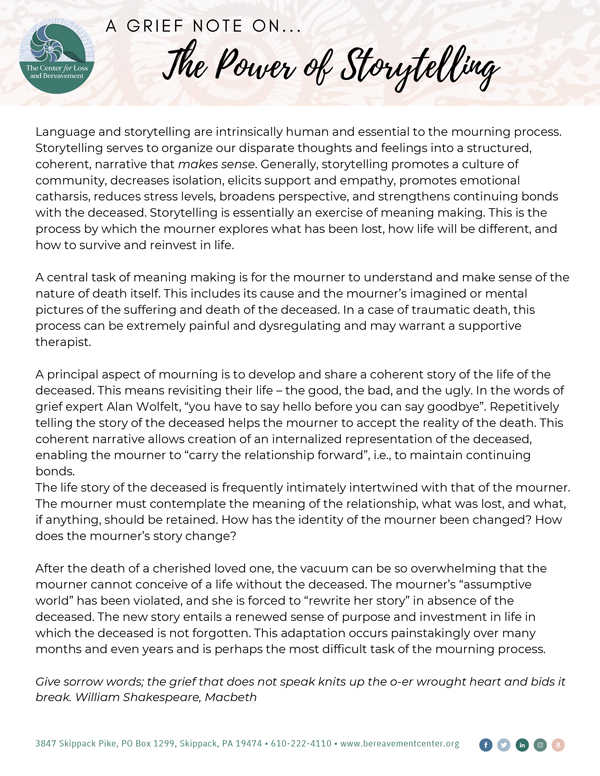CLB Grief Notes
A Grief Note On…
The Power of Storytelling
Language and storytelling are intrinsically human and essential to the mourning process. Storytelling serves to organize our disparate thoughts and feelings into a structured, coherent, narrative that makes sense. Generally, storytelling promotes a culture of community, decreases isolation, elicits support and empathy, promotes emotional catharsis, reduces stress levels, broadens perspective, and strengthens continuing bonds with the deceased. Storytelling is essentially an exercise of meaning making. This is the process by which the mourner explores what has been lost, how life will be different, and how to survive and reinvest in life.
A central task of meaning making is for the mourner to understand and make sense of the nature of death itself. This includes its cause and the mourner’s imagined or mental pictures of the suffering and death of the deceased. In a case of traumatic death, this process can be extremely painful and dysregulating and may warrant a supportive therapist.
A principal aspect of mourning is to develop and share a coherent story of the life of the deceased. This means revisiting their life – the good, the bad, and the ugly. In the words of grief expert Alan Wolfelt, “you have to say hello before you can say goodbye”. Repetitively telling the story of the deceased helps the mourner to accept the reality of the death. This coherent narrative allows creation of an internalized representation of the deceased, enabling the mourner to “carry the relationship forward”, i.e., to maintain continuing bonds.
The life story of the deceased is frequently intimately intertwined with that of the mourner. The mourner must contemplate the meaning of the relationship, what was lost, and what, if anything, should be retained. How has the identity of the mourner been changed? How does the mourner’s story change?
After the death of a cherished loved one, the vacuum can be so overwhelming that the mourner cannot conceive of a life without the deceased. The mourner’s “assumptive world” has been violated, and she is forced to “rewrite her story” in absence of the deceased. The new story entails a renewed sense of purpose and investment in life in which the deceased is not forgotten. This adaptation occurs painstakingly over many months and even years and is perhaps the most difficult task of the mourning process.
Give sorrow words; the grief that does not speak knits up the o-er wrought heart and bids it break. William Shakespeare, Macbeth
Join Our
Mailing List
Donate
Today
Request
Information

Affiliations
• NACG
• CBEM Changemaker
• ADEC
• Charity Navigator
Quick Links
About Us
Individual & Family Grief Counseling
Volunteer
News
Grief Support Resources
Contact
Ph: 610-222-4110
Fax: 610-222-4116
3847 Skippack Pike
P.O. Box 1299
Skippack, PA 19474
Support The Center For
Loss and Bereavement
